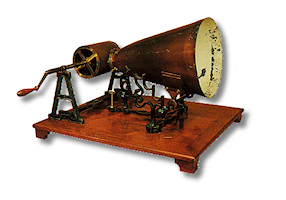
Researchers Play Tune Recorded Before Edison
By Jody Rosen
For more than a century, since he captured the spoken words "Mary had a little lamb" on a sheet of tinfoil, Thomas Edison has been considered the father of recorded sound. But researchers say they have unearthed a recording of the human voice, made by a little-known Frenchman, that predates Edison's invention of the phonograph by nearly two decades.
The 10-second recording of a singer crooning the folk song "Au Clair de la Lune" was discovered earlier this month in an archive in Paris by a group of American audio historians. It was made, the researchers say, on April 9, 1860, on a phonautograph, a machine designed to record sounds visually, not to play them back. But the phonautograph recording, or phonautogram, was made playable – converted from squiggles on paper to sound – by scientists at the Lawrence Berkeley National Laboratory in Berkeley, Calif.
"This is a historic find, the earliest known recording of sound," said Samuel Brylawski, the former head of the recorded-sound division of the Library of Congress, who is not affiliated with the research group but who was familiar with its findings. The audio excavation could give a new primacy to the phonautograph, once considered a curio, and its inventor, Édouard-Léon Scott de Martinville, a Parisian typesetter and tinkerer who went to his grave convinced that credit for his breakthroughs had been improperly bestowed on Edison.
Read more about this, including audio excerpts, at the New York Times website:














